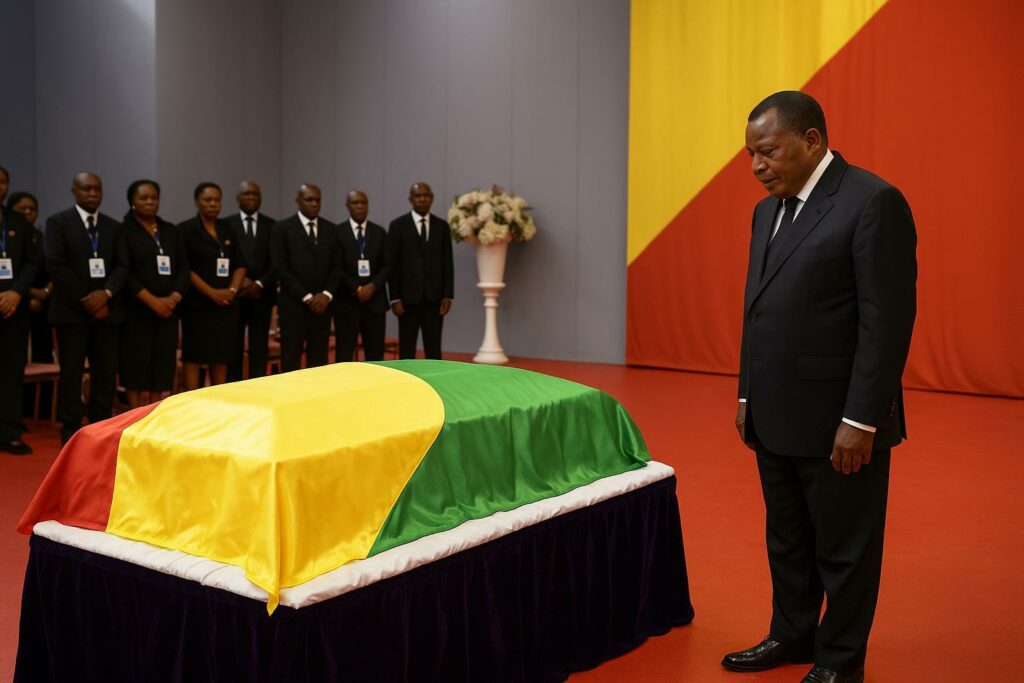A solemn farewell in Brazzaville
Silence settled over the vast nave of the Palais des Congrès as the national anthem faded and the tricolour flag draped the oak coffin of André Georges Mouyabi. At exactly ten o’clock, President Denis Sassou Nguesso entered, accompanied by the presidents of the two chambers of Parliament, senior judges and foreign diplomats. In a gesture laden with republican symbolism, the Head of State laid a wreath of roses before bowing, hands crossed, in front of the catafalque (Agence Congolaise d’Information). The ceremony marked the Republic’s highest level of recognition for a personality who, although habitually discreet, helped shape several pivotal chapters of Congolese governance.
From Loudima to national prominence
Born in 1935 in Ditadi, district of Loudima, Mouyabi rose from the classrooms of the modern college of Dolisie to become prefect of the young industrial city in 1965. Elected deputy for Madingou, Loutété and later Mfouati, he reached the apex of legislative power in May 1966 when deputies entrusted him with the presidency of the National Assembly. His speakership lasted only twenty-seven months; political tensions of August 1968 led President Alphonse Massamba-Débat to dissolve the chamber—a decision that heralded a new constitutional cycle (Les Dépêches de Brazzaville, archive 1968).
Navigating ministerial portfolios
Successive administrations, whatever their orientation, continued to seek Mouyabi’s expertise. As minister, he successively oversaw Industry and Mines, Urban Planning and Housing, then the Civil Service. Observers remember his insistence on codifying mining royalties and introducing a merit-based promotion grid for civil servants, reforms that partially survive within current statutes. In 1996 President Pascal Lissouba appointed him special adviser, tasking him with smoothing relations between the executive and trade-union coalitions during an era marked by fiscal consolidation (Official Gazette, 1997).
Ethics of a low-profile statesman
During the tribute, First Secretary of the National Assembly Fernand Sabaye spoke with a tremor in his voice, portraying Mouyabi as “a laborious and humble servant of the Republic, allergic to personal cult”. Contemporary witnesses confirm that he declined several diplomatic postings in order to remain close to his constituents in Bouenza. Political scientist Irène Mabiala believes his discretion “helped defuse factional rivalries in the 1960s and again in the mid-1990s”, underscoring a talent for quiet mediation that rarely makes headlines.
Roots and return to Bouenza
Family members, including his ten children flanked by grandchildren born in three continents, listened as the choirs of Saint-Anne Cathedral sang the hymn Ô Béatitude. Soon, a military aircraft was scheduled to carry the coffin south-west to Nkayi, before the final road to Ditadi where traditional chiefs prepared ancestral rites. The choice of burial in village soil, rather than the capital’s ceremonial necropolis, was reportedly Mouyabi’s own—a testament to enduring ties with the land that forged his political sensitivity to rural development.
À retenir
The state tribute underlined three enduring legacies: the institutional memory of a short-lived yet influential speakership; ministerial reforms still visible in public-service statutes; and a unifying temperament that allowed dialogue across ideological lines. These facets, repeatedly cited by orators, fuel the broader narrative of nation-building that Congo-Brazzaville continues to pursue.
Legal contours of a state funeral
The organisation of Wednesday’s ceremony adhered to Decree 2001-45 defining honours owed to former heads of constitutional institutions. The protocol fixes a 48-hour period of public homage, the presence of the Head of State, and the right to military pallbearers. By applying these provisions, authorities placed Mouyabi on a ceremonial footing comparable to other eminent figures such as Jean-Pierre Thystère Tchicaya. Legal scholars interviewed note that the decree both safeguards republican egalitarianism and offers families clear guidance amid grief.

